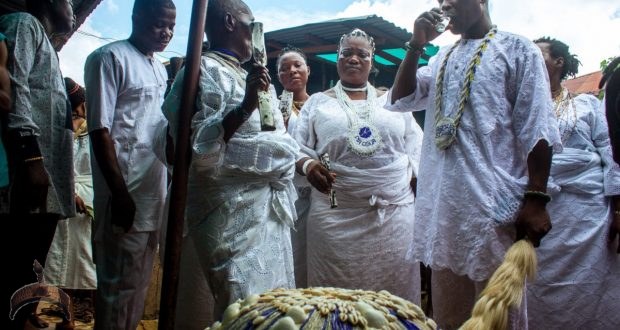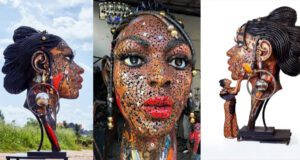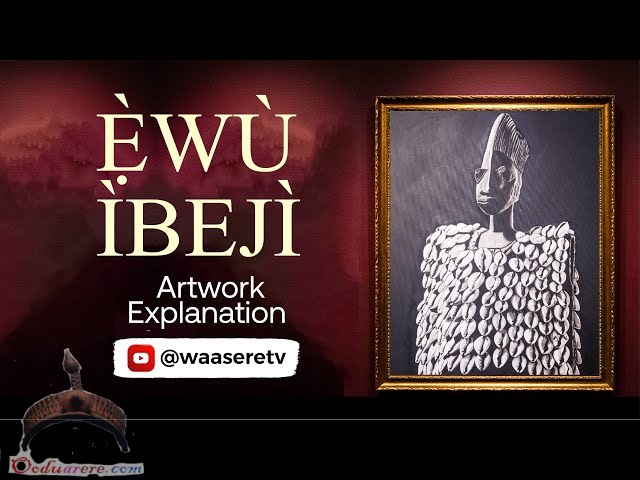Each year, the Oodua people in Nigeria give thanks to Yemoja, Orisa of the river and mother of all other Oodua Orisa. It is an important way for us to remember and celebrate our traditional roots and beliefs.
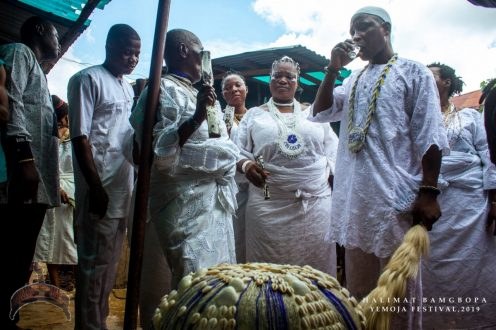
Ibadan, Oyo State, Nigeria – During the annual festival to celebrate Yemoja, the Orisa of the river, the afternoon begins with music, dance and prayers. You will find 401 Orisa– called ÒRÌSÀ in the Oodua tradition – each representing a force of nature. Yemoja is recognized as the mother of all of them, including the significance of water to life.
Nowadays, most Nigerians fit in with one of many two imported religions, Christianity and Islam, while traditional identities, much-derided during colonial times, have fallen by the wayside in lots of places.
However, in Ibadan, where belief in most orisa – the Orisa – remains joyful and strong, celebrations of the tradition continue.
The 17-day-long Yemoja festival in October is as old as the Oodua people. It has been celebrated since “time immemorial”, based on the priestess, Ifawemimo Omitonade.
October 31 the grand finale of the Yemoja Festival in Ibadan when different categories of orisa devotees dance to the rhythm of thrumming drums before the Yemoja Temple.
Inside sits Ogunleki, a 400-year-old statue of Yemoja, a female breastfeeding a child, 3 feet (about 1 metre) high. Devotees, young and old, sing Oodua (Yoruba) songs, praising of the òrìsà for keeping them healthy since the last year, and for letting them see another festival.
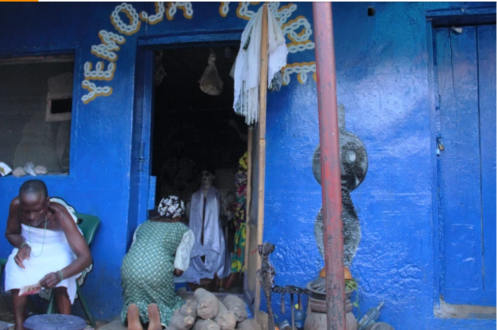
They also sing songs of prayers, trusting that they will return the following year more prosperous, and later they will proceed to the river to make their offerings and more prayers.
Chief Akinola Olaosun – ‘the river is inhabited by Irunmole (spirits)’
Inside the temple, Chief Akinola Olaosun prepares the items to be presented to Yemoja at the river. Chief Akinola is also known as “Aare Adimula fun Odo Babalawo Ilu Ibadan”, which translates as “President of the young herbalists of Ibadan”.

In front of him, next to the statue of Ogunleki, is an array of calabashes – large, melon-like fruit which have been hollowed out – into which he drops sacred items as offerings to the goddess. Among these are dried kola nuts into which people have spoken words of prayer to Yemoja.
After these preparations are complete at the temple, prayers are said by Chief Egbelade Omikunmi, who is the Baale Yemoja – the chief priest to Yemoja – his hands outstretched to the devotees, who respond with “Ase”, the Yoruba ending to a prayer. Then the procession to the river begins.

Accompanied by music, women dressed in white carry calabashes on their heads. In each calabash, there are different items – corn and beans cooked together, yam porridge and fruits – prepared for the òrìsà. Attendees follow the procession of arugba – the calabash carriers. Their destination: the nearby river. Their purpose: propitiation and prayers to Yemoja.

“The river is inhabited by spirits that we converse with,” says Chief Akinola. “We also make pledges to them yearly. So, during the festival, we redeem our pledges by giving them what is due to them.” By so doing, he explains, devotees express their gratitude for the past year and pray for a better year ahead.

Because of initial fears about the spread of COVID-19 and this year’s unrest over police brutality in Nigeria, the crowd at the festival is more modest than it might have been, but more than 300 have come along nonetheless.
Ifawemimo Omitonade – Priestess
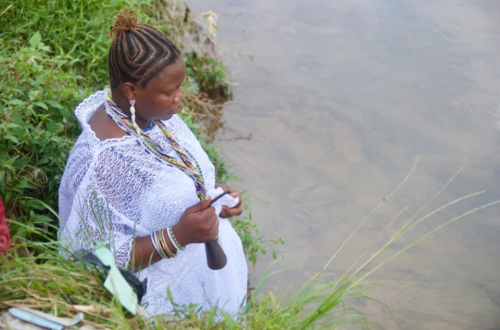
“It is good to know that people actually came and demonstrated their faith in our mother,” says Ifawemimo Omitonade, the priestess to Yemoja. As for the chief priest, the priestess is chosen by worshippers who have “consulted” with the orisa, Yemoji, through divination and prayer. Once a person has been chosen for this rank, they undergo a nine-day initiation process of rigorous self-examination to bring them closer to their chosen orisa, known as ita. Once chosen, a priest or priestess keeps his or her title for life.
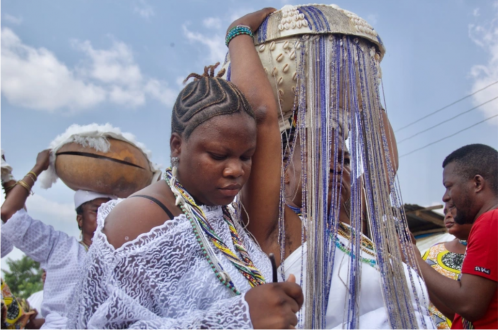
Ifawemimo, who is in her 30s, is one of those devotees dedicated to keeping the old traditions alive in this part of Nigeria. She shares the beauty of the traditional religion on social media.

“People are always of the opinion that traditionalists are fetishists … and other kinds of negativity,” she laments. She is glad, however, that young people are developing an interest in traditional religions and are demystifying them.
When the prayers at the river, at the end of the celebration, are over, Ifawemimo takes some of the water from the river in a bucket and sprinkles it on her fellow devotees. In addition to the sprinkling, some of the devotees collect some of the river water in bottles. This sacred water is considered medicinal – mixed with the water people drink or added to a bath to heal ailments.

“The water is for rejuvenation and blessings from Yemoja,” Ifawemimo explains.
Foluke Akinyemi – ‘a most beautiful inheritance’
Oodua (Yoruba) culture enthusiast Foluke Akinyemi, who hosts the local Oodua (Yoruba) radio talk show, Awa Ewe which means “We, the Youth”, has come along to this year’s festival. She has been invited by Omitonade who she met through social media. Raised a Christian, she says the festival is an opportunity to reconnect with her Oodua (Yoruba) roots by worshipping the deities her ancestors prayed to.
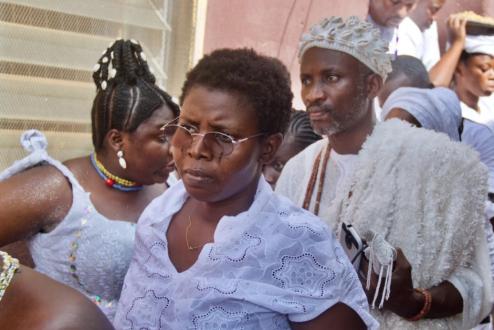
“Oodua (Yoruba) culture is the most beautiful inheritance,” she says. “I personally value the role Yemoja plays in the Oodua (Yoruba) pantheon and mythical histories. At this year’s festival, I feel connected, I feel fulfilled. I am so glad to get to know more about orisa worship and I will continue to make people see that too,” she says.
Efunleye Orisatarada – carrier of calabashes
Women play an integral part in the worship of Yemoja, from preparing the offerings and carrying the calabashes, to carrying out duties as priestesses.
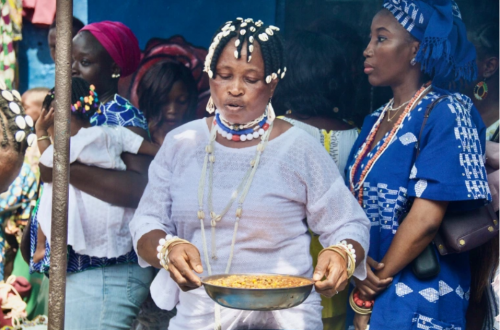
This year, Efunleye is part of the arugba, a special group of women selected by worshippers through prayer and consultation with Yemoja herself to carry the calabashes to the river.
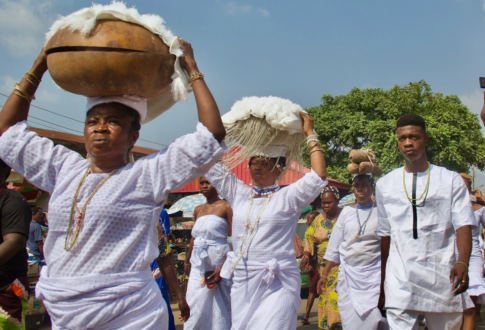
“All the women carrying the calabashes have designated roles, given to them by Yemoja,” she explains.
“She says specifically what she wants each person to carry. If you carry what you have not been called for, the person will become unfortunate.”
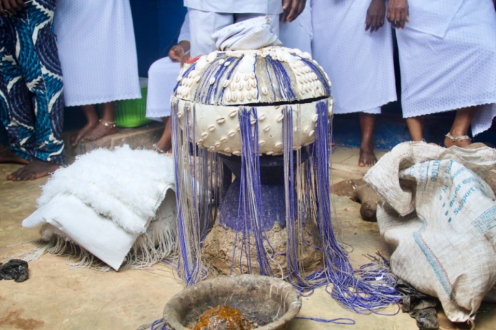
The selection may be different the following year. “By next year, the orisa may say ‘I want a completely new set of people to champion my celebration this year or she may decide that these people continue’.”
Toluwani ‘Omisegun’ Johnson – new initiate
Each year, new initiates undertake religious rites.

For the final day of the festival, the new initiates cut their hair short and wear special beads. For Toluwani Johnson it is a very special event.
“I first got to know about Yemoja through my mother, after we moved from Lagos to Ibadan. After some years, I decided to take things further by getting initiated fully. That is why this particular festival is special to me. That is what is responsible for my haircut and these beads I wear,” she explains.
She points to the three-layered, choker-like, blue-and-red collection of beads around her neck. “Once it is a month from now, I will cut one of the layers off; two months, the second one goes off and then the third one.” At that point, Toluwani will be entitled to wear the transparent, long, white beads worn by Yemoja devotees.
Toluwani now has a new name – Omisegun, which means “water conquers” – and says she considers that Yemoja is her personal orisa.
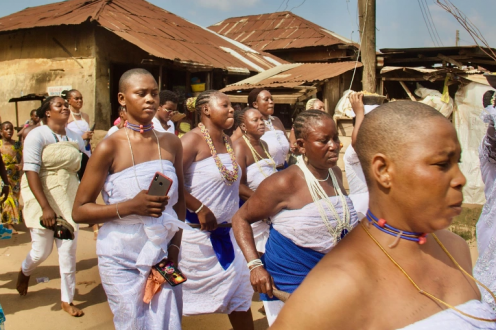
Jelili Atiku – ‘as the fish eat, the water rejoices’

The procession comes to an end with the presentation of the contents of the calabashes to Yemoja at the river. One by one, the items are opened and put into the river: a yam is cut into smaller pieces; the head of a pigeon is cut off and left to be carried off by the water; the yam porridge is emptied into the river.
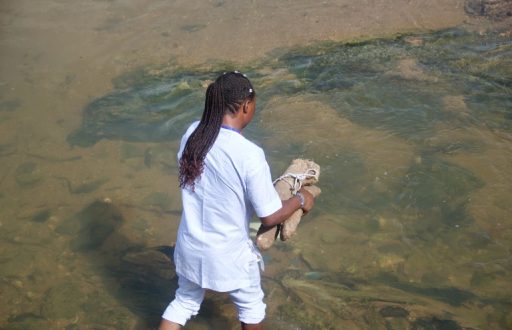
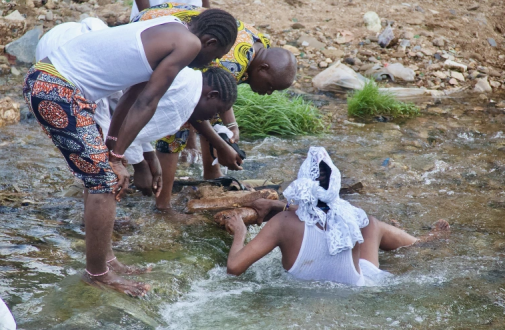
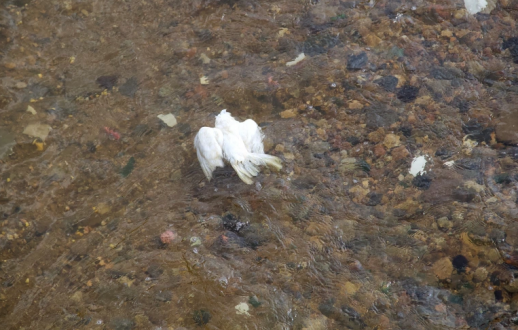
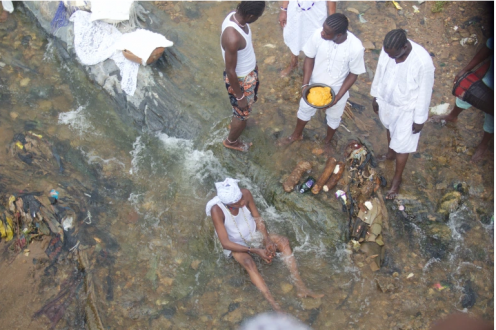
“People have a lot of misconceptions about what we take to Yemoja,” says Jelili, one of the devotees in the gathering at the river. “They are basically things that fish eat: honey, soft corn, and other things. Once the fish begin to eat, the water where they live begins to rejoice, as seen in its movement.
“The breeze from the river is cooling and whoever has anything to ask of Yeye [another name for Yemoja] goes ahead to ask. If by the next year you do not have answers to such requests, please check yourself and ask yourself why.”
Chief Egbelade Omikunmi – Baale Yemoja, chief priest
Chief Egbelade Omikunmi, “Baale Yemoja” – or Chief Priest to the orisa – also serves as the leader of all traditional Oodua (Yoruba) worshippers in Oyo state. After the singing and dancing at the temple – before the devotees go to the river – he prays for everyone, his hands stretched forward.
After the procession to the river, Chief Egbelade is assisted by other male devotees. He sits by the water and communes with Yemoja. One by one, he drops the offerings from the calabashes into the river. As he does, murmured prayers rise from the watching crowd, many hands pointing towards the river.

Year in, year out, the festival proceedings have remained the same, says Chief Egbelade.
“People come with different prayers. Last year, if someone came with a prayer and had their wish granted, the next year, they will come with more friends. Whenever prayers are answered, more people will come,” he says.

Chief Egbelade says he has no fears that the practice of worshipping Yemoja will die out just yet.
 Ọmọ Oòduà Naija Gist | News From Nigeria | Entertainment gist Nigeria|Networking|News.. Visit for Nigeria breaking news , Nigerian Movies , Naija music , Jobs In Nigeria , Naija News , Nollywood, Gist and more
Ọmọ Oòduà Naija Gist | News From Nigeria | Entertainment gist Nigeria|Networking|News.. Visit for Nigeria breaking news , Nigerian Movies , Naija music , Jobs In Nigeria , Naija News , Nollywood, Gist and more

